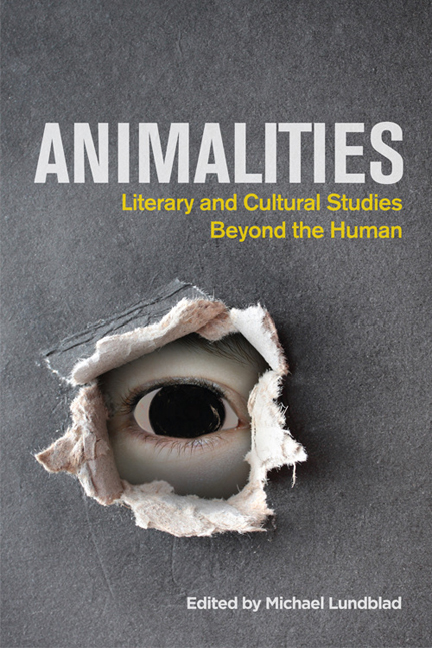Book contents
- Frontmatter
- Contents
- List of Figures
- Acknowledgments
- Introduction: The End of the Animal – Literary and Cultural Animalities
- 1 Each Time Unique: The Poetics of Extinction
- 2 Posthuman New York: Ground Zero of the Anthropocene
- 3 J. G. Ballard's Dark Ecologies: Unsettling Nature, Animals, and Literary Tropes
- 4 Staging Humanimality: Patricia Piccinini and a Genealogy of Species Intermingling
- 5 “Sparks Would Fly”: Electricity and the Spectacle of Animality
- 6 The Nature of Birds, Women, and Cancer: Terry Tempest Williams's Refuge and When Women Were Birds
- 7 Animality, Biopolitics, and Umwelt in Amitav Ghosh's The Hungry Tide
- 8 Looking the Beast in the Eye: Re-animating Meat in Nordic and British Food Culture
- 9 Love Triangle with Dog: Whym Chow, the “Michael Fields,” and the Poetic Potential of Human-Animal Bonds
- 10 Bestial Humans and Sexual Animals: Zoophilia in Law and Literature
- Notes on Contributors
- Index
Introduction: The End of the Animal – Literary and Cultural Animalities
Published online by Cambridge University Press: 07 December 2017
- Frontmatter
- Contents
- List of Figures
- Acknowledgments
- Introduction: The End of the Animal – Literary and Cultural Animalities
- 1 Each Time Unique: The Poetics of Extinction
- 2 Posthuman New York: Ground Zero of the Anthropocene
- 3 J. G. Ballard's Dark Ecologies: Unsettling Nature, Animals, and Literary Tropes
- 4 Staging Humanimality: Patricia Piccinini and a Genealogy of Species Intermingling
- 5 “Sparks Would Fly”: Electricity and the Spectacle of Animality
- 6 The Nature of Birds, Women, and Cancer: Terry Tempest Williams's Refuge and When Women Were Birds
- 7 Animality, Biopolitics, and Umwelt in Amitav Ghosh's The Hungry Tide
- 8 Looking the Beast in the Eye: Re-animating Meat in Nordic and British Food Culture
- 9 Love Triangle with Dog: Whym Chow, the “Michael Fields,” and the Poetic Potential of Human-Animal Bonds
- 10 Bestial Humans and Sexual Animals: Zoophilia in Law and Literature
- Notes on Contributors
- Index
Summary
Hvordan sier du “animality studies” på norsk? How do you say “animality studies” in Norwegian? How would you translate it? How about “animal studies”? I pose these questions to my graduate students at the University of Oslo, as an American trying to learn Norwegian, without knowing what the best translations or neologisms might be. But what am I asking? What does “animality studies” or “animal studies” mean in English? How do we explain what these fields are to English speakers as well as students and scholars around the world? How is animality studies different from animal studies, or critical animal studies, or human-animal studies, or humanimal studies, or species studies, or posthumanism? And what does it all have to do with literary and cultural studies? The chapters in this volume help to explore potential answers to these questions, but they are not necessarily focused on explicit distinctions or definitions of these terms. To be bold, then, in an attempt to clarify what we are doing in these perhaps murky waters, I want to call for a change. I think we can distinguish more clearly between the various projects that have often been lumped together under the umbrella of animal studies. But “animal studies” strikes me as the least productive possibility out of all of these terms, if only because it has come to include such a wide range of work that can often be at odds with (if not explicitly opposed to) each other. I propose dropping the use of “animal studies.” If “the” animal is over, following Derrida – if some of us believe that it no longer makes sense to lump together all nonhuman animals in a singular opposition to “the human” – then we might be able to think further about the end of the animal and the end of animal studies. To what ends do we engage these various projects? How do literary and cultural studies in particular move beyond the human?
I think it will help to identify what I call “animalities” as objects of study that can be approached in three primary ways.
- Type
- Chapter
- Information
- AnimalitiesLiterary and Cultural Studies Beyond the Human, pp. 1 - 21Publisher: Edinburgh University PressPrint publication year: 2017



